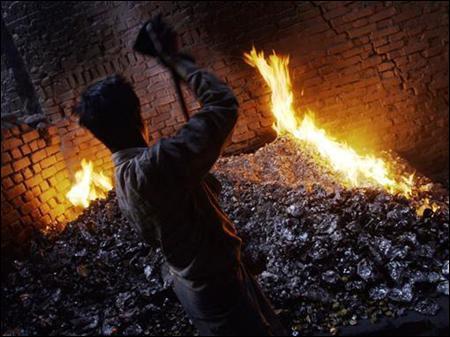Photographs: Adeel Halim/Reuters Abhineet Kumar in Mumbai
Last month, when Novelis commissioned Asia's largest beverage can recycling plant in South Korea, it added one more feather in the Aditya Birla Group's cap.
The Novelis acquisition has done quite well for the fortunes of Hindalco, as it has consistently generated cash. In 2009-10, it generated 65 per cent (Rs 3,000 crore) of the parent's cash flow. In 2011-12, it generated even more at 72 per cent (Rs 5,000 crore).
Apart from this, in 2007, Hindalco's cost of acquiring the company - $6 billion (Rs 26,400 crore) - included $3.5 billion (Rs 15,400 crore) in cash and debt takeover of $2.5 billion (Rs 11,000 crore). But in 2010, Novelis repatriated $1.7 billion (Rs 7,600 crore) to the parent, thereby returning 50 per cent of the initial cost.
This was achieved by successfully negotiating with bond holders and bankers at a net debt to Ebitda covenant of three times. This relaxation removed the restriction of capital deployment and made cash fungible between the two companies.
What has dented this rosy picture is the steady decline in the return on capital employed (RoCE). Last year, Hindalco's RoCE (on consolidated basis) was 8.3 per cent - lower than the borrowing cost. In 2007, before it took over the company, the RoCE stood at 21 per cent. Market capitalisation, as a result, is still at Rs 21,000 crore, the same as that of March 2006 whereas the company's revenues (on consolidated basis) have grown seven times.
The beginning of the deal wasn't the best as the acquisition of Novelis was considered a drag on Hindalco's balance sheet, for the payments were made through Hindalco's corporate guarantee of $ 3.1 billion (Rs 13,640 crore) and $450 million (Rs 1,980 crore) by liquidating some treasury stocks.
Following the acquisition, Novelis reported Rs 276.8 crore (Rs 2.77 billion) of loss in 2007-08. And the economic crisis took a toll on its balance sheet. In 2008-09, the losses worsened to Rs 9,750 crore (Rs 97.5 billion). The losses included $1.5 billion (Rs 7,605 crore) as goodwill impairment charge in the year. It was the first company to report goodwill impairment caused by the stock market crash and economic slowdown.
However, the company was able to live up to its promise to make the deal value accretive by 2010. The turnaround actually started in December 2009, when a number of loss-making contracts expired and things started looking up. To merge the high-cost model of Novelis with that of Hindalco's low-cost operations, project "Sunrise" was launched by Hindalco with a liquidity support of $100 million. Unproductive and high cost operations in the UK were shut down or relocated to India and even the workforce was rationalised by close to 10 per cent.
By 2010, Novelis' equity value more than doubled to around $8 billion (Rs 35,760 crore). Its enterprise value (EV) of $12 billion (Rs 53,640 crore) was also two times its 2007 enterprise value.
"The Novelis turnaround can be attributed to a very systematic and aggressive performance improvement along with overcoming the legacy issues," said Abhishek Poddar, senior principal, at global management consultancy firm A T Kearney.
Novelis reported profits of Rs 745 crore (Rs 7.45 billion) in the first half of the current financial year, as demand for rolled products continued to grow.
Now the company's focus on more recycled products in its portfolio has once again helped it revive its profit and it promises to do better in future. The new recycling plant in South Korea is a part of $400 million (Rs 2,200 crore) expansion of Novelis' operations in South Korea that will help it increase the recycled content of its rolled aluminum products to 80 percent by 2020, from 35 per cent currently.
The company is also expanding its recycling facilities in Brazil and Germany to take annual capacity to 2.1 million tonnes by 2015 from 1.4 million tonnes now.
The downstream facilities at Novelis are primarily focused on beverage cans and auto parts for which the demand is still growing. Using scrap aluminium as a raw material for producing value added products provides a cost advantage of $130-150 (Rs 7,150-8,250) a tonne. With this Novelis is expected to boost earnings despite lukewarm demand for aluminium that Hindalco makes.
"Global downstream continues to surprise positively, while India upstream surprises negatively," said Pinakin Parekh, analyst with global brokerage J P Morgan in its recent note in Hindalco. The growth thrust, clearly, is coming from Novelis.



article